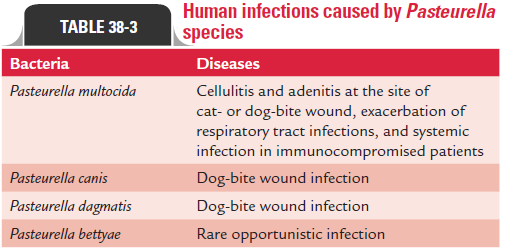Chapter: Microbiology and Immunology: Bacteriology: Haemophilus, Pasteurella, and Actinobacillus
Pasteurella
Pasteurella
Pasteurella are nonmotile Gram-negative coccobacilli andare aerobes and facultative anaerobes. They show a bipolar appearance in stained smears. They grow on blood agar and chocolate agar, but show variable growth on the MacConkey agar. They are commonly found as commensals in the orophar-ynx of healthy animals and cause septicemia in a variety of ani-mals and birds. They are found rarely in the human oropharynx.
The genus Pasteurella consists of more than 17 species. Pasteurella multocida is the most common species causing infec-tion in humans. Other species, which rarely cause human infections, include Pasteurella canis, Pasteurella dagmatis,Pasteurellapneumotropica, Pasteurella aerogenes, Pasteurella haemolytica, Pasteurella caballi, and Pasteurella bettyae (Table 38-3).Most human infectionsresult from animal contact, such as animal scratches, bites, etc.

Pasteurella multocida
P. multocida is a nonmotile Gram-negative bacillus. The organ-ism generally resembles Yersinia, but differs from it in being oxi-dase positive and producing indole. The bacterium grows well on blood and chocolate agars, but grows poorly on MacConkey agar. On blood agar, after overnight incubation, P. multocida produces large buttery colonies with a characteristic musty odor of the colonies due to production of indole.
P. multocida is present in the upper respiratory tract of dogs,cats, rats, cattle, and sheep. The bacteria sometimes are also present in the human upper respiratory tract. Human infec-tion is rare but may occur following animal bites or trauma. After a bite or scratch by cats or dogs, a localized cellulitis and adenitis occurs at the site of bite. Patients with underly-ing pulmonary lesions may also show exacerbation of respira-tory tract infections (such as pneumonia, bronchitis, sinusitis). P. multocida in immunocompromised patients may cause asystemic infection.
Penicillin is the antibiotic of choice. Tetracycline, cepha-losporins, or fluoroquinolones are other antibiotics equally effective against the bacteria.
Related Topics